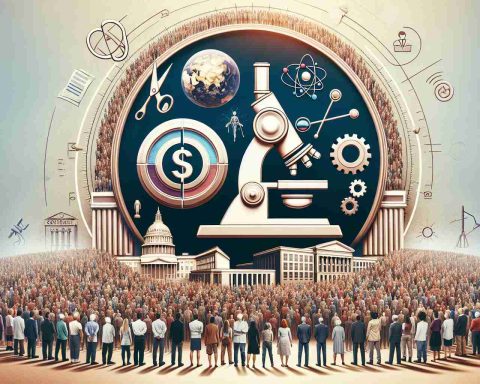International survey results are encouraging for the scientific community. An extensive global survey encompassing nearly 72,000 participants from 68 different nations has illuminated widespread confidence in scientists and a strong desire for their involvement in governmental decision-making.
This study, published in Nature Human Behaviour, contradicts the narrative of eroding trust in science, suggesting instead that a majority of the global population retains significant faith in scientific experts. According to an academic report co-authored by Dr. Mathew Marques, there is a notable demand for greater scientific engagement in public policy development.
Within the data, Australians emerged as the fifth most trusting nation regarding science, following Egypt, India, Nigeria, and Kenya. Conducted by a team of 241 researchers over the span of a year, the survey collected detailed information on participants’ demographics and their perspectives on science’s role in governance.
Critically, the research observed that political beliefs influenced trust levels differently across regions. For example, in North America and several Western European nations, conservatism correlated with skepticism towards science. Conversely, certain Eastern European and African nations exhibited a relationship where right-leaning politics aligned with stronger support for scientific authority.
Overall, the findings indicate a clear message: while trust in science is high, there are expectations for scientists to engage in open dialogue and collaborate more with the public to foster trust further.
Global Trust in Science: Implications for Society and Governance
The results of the international survey reflect a resounding affirmation of science’s role in shaping societal norms and policies. As public confidence in scientific expertise flourishes, it suggests a potential shift in how governments may integrate scientific reasoning into their frameworks. This could lead to more evidence-based decision-making, transforming contentious political debates into collaborative dialogues rooted in empirical data.
Moreover, heightened trust in scientific authority may bolster public support for crucial sectors, such as health and environmental policy. Increased engagement with scientists can pave the way for informed public discourse, influencing cultural attitudes towards issues ranging from climate change to public health initiatives. For instance, as communities increasingly depend on scientific insights for sustainability practices, the demand for science-led solutions could reshape industries and drive innovation in the global economy.
As we look toward the future, the implications of this trust extend beyond immediate governance. It signals a trend where scientific literacy could become a critical component of citizenship, encouraging educational systems worldwide to emphasize critical thinking and scientific understanding. Ultimately, fostering collaboration between citizens and scientific communities may yield long-term benefits, creating resilient societies capable of tackling complex global challenges while ensuring that environmental considerations remain at the forefront of policy discussions.
New Study Reveals Global Confidence in Science and Calls for Greater Engagement
Encouraging Trends in Public Trust for Scientists
A recent global survey, involving nearly 72,000 participants from 68 countries, has shed light on the public’s strong confidence in scientists and their crucial role in governmental decision-making. Published in the prestigious journal Nature Human Behaviour, the findings challenge the prevailing narrative of declining trust in scientific institutions, indicating that a significant portion of the global population remains optimistic about the influence and capabilities of scientific experts.
Key Insights from the Survey
1. Global Confidence Levels: The survey found that a majority of individuals across various nations express considerable faith in scientists. Countries like Egypt, India, Nigeria, and Kenya were among the highest in terms of trust, with Australia ranking fifth.
2. Desire for Scientific Engagement: There is a notable push from the public for scientists to engage actively in the development of public policy. This desire reflects an emerging trend where citizens expect a collaborative approach between scientific communities and governance systems.
3. Political Influence on Trust: The study revealed intriguing patterns concerning political affiliation and trust in science. In North America and many Western European countries, conservative political beliefs tended to correlate with skepticism toward scientific authorities. In contrast, some Eastern European and African nations displayed a trend where right-leaning ideologies showed stronger support for scientific insight.
Use Cases and Implications for Scientists
The findings have several implications for scientists and policymakers:
– Public Communication: There is a clear necessity for scientists to engage in open dialogue with the public, breaking down complex scientific matters into more comprehensible information.
– Policy Development: By involving scientists in policymaking, governments could address public concerns effectively, enhancing the trust citizens have in governmental decisions.
– Educational Initiatives: As trust levels vary by region and political alignment, targeted educational efforts may be essential to bridge gaps in understanding and skepticism surrounding scientific facts.
Limitations and Considerations
While the survey highlights positive sentiments toward science, it also emphasizes that trust is not uniform and can fluctuate based on political contexts. Further research may be needed to explore the reasons behind these regional differences and to develop strategies that enhance trust universally.
Conclusion: A Call for Collaboration
This extensive survey serves as a crucial reminder of the value placed on scientific authority in decision-making processes. It highlights the need for scientists to step forward, engage more effectively with the public, and become integral partners in conversation regarding policies that affect society.
For more insights on the intersection of science and public policy, visit Nature.








